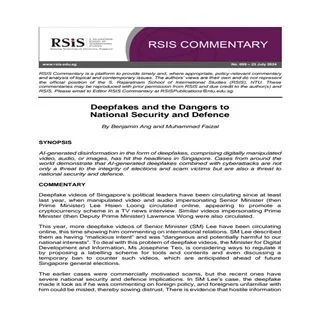By Benjamin Ang and Muhammad Faizal
AI-generated disinformation in the form of deepfakes, comprising digitally manipulated video, audio, or images, has hit the headlines in Singapore. Cases from around the world demonstrate that AI-generated deepfakes combined with cyberattacks are not only a threat to the integrity of elections and scam victims but are also a threat to national security and defence. COMMENTARY Deepfake videos of Singapore’s political leaders have been circulating since at least last year, when manipulated video and audio impersonating Senior Minister (then Prime Minister) Lee Hsien Loong circulated online, appearing to promote a cryptocurrency scheme in a TV news interview. Similar videos impersonating Prime Minister (then Deputy Prime Minister) Lawrence Wong were also circulated. This year, more deepfake videos of Senior Minister (SM) Lee have been circulating online, this time showing him commenting on international relations. SM Lee described them as having “malicious intent” and was “dangerous and potentially harmful to our national interests”. To deal with this problem of deepfake videos, the Minister for Digital Development and Information, Ms Josephine Teo, is considering ways to regulate it by proposing a labelling scheme for tools and contents and even discussing a temporary ban to counter such videos, which are anticipated ahead of future Singapore general elections. The earlier cases were commercially motivated scams, but the recent ones have severe national security and defence implications. In SM Lee’s case, the deepfake made it look as if he was commenting on foreign policy, and foreigners unfamiliar with him could be misled, thereby sowing distrust. There is evidence that hostile information campaigns are used to weaken national cohesion or disrupt society in the lead-up to hostilities or as part of geopolitical contestation.
S. Rajaratnam School of International Studies, NTU Singapore , 2024. 4p.



